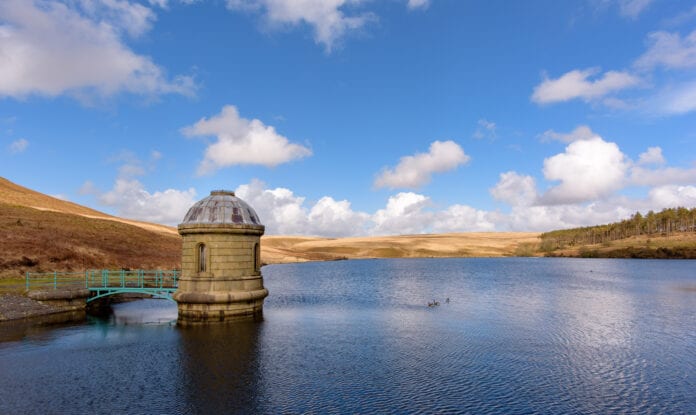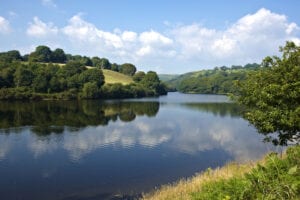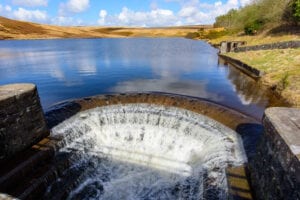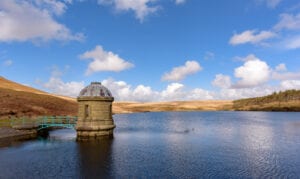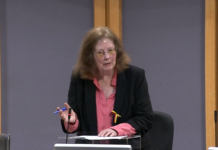- Welsh Water in partnership with Natural Resources Wales, Swansea Council & Canoe Wales has secured £103k ‘Access to Water’ funding from Welsh Government.
- Lliw Reservoirs, near Swansea is set to become a hub for recreation, health and wellbeing with a pontoon and boat wash, improved paths, interpretation and a woodland nature trail
- Contributes to the Wellbeing of Future Generations Act and a ‘green recovery’ in Wales
A well-loved beauty spot in Swansea has been given an ‘Access to Water’ grant of £103k from Welsh Government that will enable a range of improvements for visitors to Lliw reservoirs.
The ‘Access to Water’ funding is an important milestone in achieving shared ambitions for the site enabling a range of paddlesports to the reservoir, including stand-up paddle boarding, canoeing and kayaking. It will enable the creation of a boat wash for biosecurity and a pontoon that allows easy access to water for people of all abilities. Many local clubs have expressed a keen interest in using the reservoir for regular water sports activities. The site is already popular with local people who enjoy the café, small shop and walking routes on site.
Other visitor improvements include the creation of a new public footpath around western side of Lower Lliw reservoir to connect footpath MW16 to common land and create a circular walking route around reservoir, which will be adopted by Swansea Council. An informal path through Brynllefrith Woodlands will be upgraded so that it is suitable for wheelchairs and bicycles and all year-round use. New interpretation and a nature trail with wood carvings is also planned for visitors to enjoy the nature in abundance around the reservoir. The area is a site of outstanding natural beauty and part of the Valley’s Regional Park, one of the special character landscape areas that define Wales. The reservoirs are surrounded by a mosaic of habitats and support a wide diversity of flora and fauna, many of which are considered rare.
The project is well placed to support the delivery of The Wellbeing of Future Generations Act (Wales) 2015, which requires public bodies in Wales to think about the long-term impact of their decisions, to work better with people, communities and each other, and to prevent persistent problems such as poverty, health inequalities and climate change. Whilst Welsh Water is not a public body, it is committed to working in partnership with Swansea Council, Natural Resources Wales and Canoe Wales in the spirit of the legislation.
Welsh Government wants to see concerted; collaborative action taken by stakeholders to increase recreational access to inland waters, in line with Covid19 regulations, with the following outcomes:
- Increased and more frequent participation, across a range of recreation types;
- More inland waters accessible more of the time.
By working in partnership DCWW believe that Lliw reservoirs can contribute positively to this vision.
The development of Lliw reservoirs for access and recreation will support a green recovery in Wales by enhancing the natural environment; improving the visitor experience, infrastructure and facilities; and building strong partnerships locally. It contributes to Swansea Public Sector Board’s objectives on health & wellbeing by providing quality and accessible facilities, enabling access to the natural environment and improving health and well-being, creating a sense of pride and belonging by encouraging greater use and a sense of ownership.
Welsh Water Chief Executive Peter Perry said, “The Upper & Lower Lliw reservoirs provide a potable water supply and so protecting water quality is of vital importance, while safeguarding a highly regarded natural local beauty spot. This project will also take us one step closer to delivering our ambitions to reconnect people with water and the environment. We hope that the site becomes a hub for health and wellbeing for visitors to develop a deeper connection with the outdoors.”
Minister for Environment, Energy and Rural Affairs, Lesley Griffiths, said: “This is an excellent example of a scheme which increases opportunities for outdoor recreation and provides safe access to water for people of all abilities. The development of these reservoirs will enable local people and visitors to gain more enjoyment from this beauty spot in line with covid19 guidelines and help to support a green recovery in Wales. I hope the success of this project will encourage development of many more similar opportunities over the coming years.”
Phil Stone, Places to Paddle Manager for Canoe Wales, the national governing body for paddlesport in Wales, added, “We are really pleased to be able to work with Dwr Cymru to help them achieve their ambitions to reconnect people with the water environment. We have recently seen a massive increase in the demand for canoeing, kayaking and stand up paddleboarding, but the limited number of venues in Wales suitable for new paddlers has always been a major obstacle. Opening up opportunities at Lliw will make it possible for people of all abilities to enjoy the water, and for many to discover a passion for paddlesport and develop a deep connection with the outdoors.”
Dave MacCallum, Specialist Advisor for Water Access & Recreation at Natural Resources Wales and Chairman of NAFW Access to Water Sub-Group said, “We are delighted to be a part of this important collaboration in South Wales; with NRW being committed to enabling responsible, inclusive recreation of Wales’ inland waters. Lliw reservoirs will now benefit from bespoke all-ability paddle-sport access facilities, along with a Biosecurity station promoting and enabling the Check Clean Dry code of practice; further paving the way for future recreation access to our inland waters for current and future generations.”
Help keep news FREE for our readers
Supporting your local community newspaper/online news outlet is crucial now more than ever. If you believe in independent journalism, then consider making a valuable contribution by making a one-time or monthly donation. We operate in rural areas where providing unbiased news can be challenging. Read More About Supporting The West Wales Chronicle





















